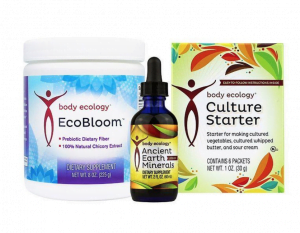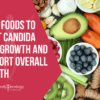Eight Reasons Your Brain May Not Be Functioning Like It Used To (And How to Improve Your Brain Health)

Are you forgetting things or does your brain just not seem to be functioning like it used to? Improve your brain health with cultured foods, which have been an integral part of the healthiest diets for thousands of years and are essential to a long, healthy life. They give birth to a lavish inner ecosystem, greatly enhancing digestion and the gut-brain axis.
If you find yourself losing the car keys, mixing up your children’s names or starting something and forgetting what you were about to do, you might be worried about your brain health.
The thing is, “forgetfulness” as we age seems so common that it receives cute names like “having a senior moment.”
There are reasons why so many people forget things as they age, but what’s important to know is that YOU don’t have to lose your memory or brain health as you age.
In this article, we’ll cover the eight key reasons memory starts to fail as people age and what YOU can do to keep your brain in tip-top shape.
Possible Causes of Memory Loss With Age
Here are eight possible causes of memory loss with age:
1. Pharmaceutical drugs, over the counter drugs, alcohol and recreational drugs – Whether taking medications or taking recreational drugs, all of these substances interfere with your neurotransmitters that are critical for memory. Neurotransmitters are chemicals messengers in your brain.1,2,3
2. Depression – chronic depression may lead to a reduction in neurons responsible for memory in the brain affecting concentration and information processing.4
3. Thyroid problems – your thyroid controls metabolism. If your metabolism is too fast or too slow, it can impair your ability to concentrate or focus, thereby affecting your ability to remember things.5
4. Vitamin B12 deficiency – Vitamin B12 protects neurons, boosts your mood and helps keep you energized. Too many people are deficient in vitamin B12, which can create symptoms or memory loss very similar to Alzheimer’s disease.6
5. Candida and poor digestive health – Whether you know it or not, your enteric nervous system in your intestines has the same number of neurotransmitters as your brain. Scientists have found that some decisions are made in your enteric nervous system before they travel up to your brain. When your digestive heath is poor, you suffer from what Body Ecology calls an “imbalanced inner ecosystem.” This is when your intestines have too many “bad guys” (bad bacteria and yeast) and too few “good guys” (good bacteria and yeast). The result is candida (a systemic fungal infection),leaky gut, food allergies, foggy thinking, memory loss, chronic fatigue, weight gain, abdominal pain, gas, bloating and/or skin problems.7
The truth is, your digestive health affects your overall well-being, including your brain health!8
6. Toxins – There are two types of toxins – exogenous, which are environmental toxins and endogenous, which are metabolic toxins. Endogenous toxins can be produced as a result of normal metabolic activities and an unhealthy gut.
Environmental toxins, like lead, mercury, carbon monoxide and pesticides can be found in your home, workplace or outside. Beauty and personal care products, fabrics and food also contain toxic chemicals, all of which can affect your memory and brain health…not to mention your overall health.9 Additionally, endogenous and exogenous toxins may contribute to atherosclerosis, a form of cardiovascular disease.14
7. Poor nutrition – Eating a diet full of sugar, soda pop/energy drinks, fast food and processed foods and lacking in properly digested proteins and fats contributes to a breakdown of your digestive health and your brain health. Today, poor diets are one of the biggest culprits for chronic illness and disease including brain related disorders like Alzheimer’s.10
8. Lack of sleep – In a Harvard based Nurses’ Health Study, regardless of whether someone didn’t get enough sleep (5 or less hours) or slept too much (9 or more hours), the people who faired better were those who got just enough (7-8 hours of sleep). The results showed those who under-slept and over-slept were mentally 2-years older than the women who got 7-8 hours of sleep.11
Dr. Lewine, Chief Medical Editor of Harvard Health Publishing, goes on to mention that those with poor sleep habits are also more inclined to have high blood pressure, which decreases blood flow inside the brain which may impair someone’s ability to function properly.
The good news is, if you look at the list of these eight possible memory-inhibitors, none of them are really due to aging…instead, they are all due to lifestyle choices.
So how can you make a change to improve your memory AND your overall well-being?
Three Steps to Improved Memory and Well-Being
1. Improve your diet. Following a whole-foods Body Ecology diet is one of the most important steps you can take to improving your memory and overall health. The Body Ecology system of health and healing is more than a diet. It is a system of nutrition that helps correct digestive health, cleanse your body of toxins, boost your immunity and create energy.
Most people following Body Ecology report that they are feeling better, sleeping better and that they have the energy to take on life’s challenges. Healing your gut is one of the most effective ways to heal your brain.12
In fact, this step is so important that it may be all you need to combat each of the items in the list of eight memory-inhibitors above. From improving your digestive health to better assimilation of vitamins and minerals to improving your mood and thyroid health, good nutrition is key when it comes to your health.
2. Consume fermented foods and drinks. Fermented foods and drinks, like cultured vegetables and probiotic liquids are cornerstones of the Body Ecology Way of Life. These forgotten foods are the greatest secret our ancestors, from almost every culture worldwide, used to stay healthy and strong. With more research about the gut-brain axis, studies show how fermented foods have many beneficial effects on the brain and cognitive function.13
Adding ½ cup of cultured vegetables or 3 oz. of a probiotic liquid, like Cocobiotic, to your daily meals is a great way to boost your health, immunity, energy, beauty and memory.

In today’s modern world, with pesticides and toxins in our food, water and the environment, it’s important to detoxify. Most people don’t know how and when to detoxify…and after thousands of requests for training, Body Ecology founder Donna Gates is has created a convenient, affordable detoxification training that you can attend online!
Now you can join Donna Gates and her team of medical and natural health experts for Body Ecology’s Detoxification Training. Learn more!
3. Detoxify. We can’t emphasize enough the importance of detoxification. While you can change many of your habits from the list above, like getting more sleep, eating a Body Ecology diet and reducing your exposure to toxins, there will still be some level of toxins we are all exposed too.
Pollution, cigarette smoke and toxins in the workplace (carpets, fabrics, heating and cooling systems, etc.) are all largely unavoidable. But you don’t need to live in a bubble to protect yourself! Instead, you can take the time to detoxify regularly.
Most people do not know how to detoxify, including the steps to take, the right detox diet to follow and how to tell the difference between illness and detox symptoms. For this reason, we have a Detoxification Training. Donna Gates is joined by her team of top medical and natural health experts to teach you the secrets of detoxification so you can look and feel your best at any age.
Memory loss does not have to be a part of your experience. Just a few steps and you can change the course of your brain health – and your overall health – no matter what your age!
To learn more: Finally, Detoxification Secrets for Looking and Feeling Your Best Revealed!
4. Get some sleep! Dr. Lewine, Chief Medical Editor of Harvard Health Publishing pointed out that those getting a normal night sleep of 7-8 hours, they were 2 years younger than those who under-slept or over-slept.
In the human body, the circadian rhythm creates a 24-hour cycle. Sleep is a part of this cycle.
In a healthy individual, levels of cortisol (a stress hormone) are at their highest during the day. Levels of melatonin (a “nighttime” hormone and antioxidant) are at their highest during the night. These hormones—cortisol and melatonin—cue and regulate the circadian rhythm. Dr. Voigt-Zuwala, Assistant Professor & Director, Circadian Rhythm Research Laboratory at Rush University explains that, “Sleep is a consequence of circadian rhythms.”
According to Dr. Voigt, changes in the inner ecosystem may be contributing to long-term disease patterns. “We believe that chronic circadian rhythm disruption promotes/exacerbates inflammatory-mediated diseases, at least in part, due to changes in the intestinal microbiota.”15,16
“It’s something that needs to be addressed,” Dr Voigt explains. “…take precautions, watch your diet, take pre- and probiotics, monitor your health, be vigilant.”
When we repeatedly disrupt the circadian rhythm and cheat our body of the sleep that it needs, we also disrupt the release of hormones that keep this cycle intact.
If you go back to point #1 about improving your diet, this is truly a vital step in helping sleeping patterns.
Sources:
- National Institute on Drug Abuse. Impacts of Drugs on Neurotransmission.
- American Addiction Centers. How Drugs Affect the Brain and Central Nervous System.
- Wallace DR, Crosswy KK. Interactions between over-the-counter and illicit drugs utilizing cytochrome p450 metabolism: Potential for exacerbation of pharmacological response. Toxicol Forensic Med Open J. 2017; 2(2): 49- 60. doi: 10.17140/TFMOJ-2-120
- The Guardian. Chronic Depression Shrinks Brain’s Memories and Emotions.
- Harvard Health Publishing – Harvard Medical School. The lowdown on thyroid slowdown.
- Harvard Health Publishing – Harvard Medical School. Vitamin B12 deficiency can be sneaky, harmful.
- Medical News Today. Candida infection can reach brain and impair memory.
- Harvard Health Publishing – Harvard Medical School. The gut-brain connection.
- Dementia.org. Dementia from toxic substances.
- Alzheimers.net. Nutrition and Dementia: Foods that May Induce Memory Loss & Alzheimer’s.
- Harvard Health Publishing – Harvard Medical School. Too little sleep, and too much, affect memory.
- Harvard Health Publishing – Harvard Medical School. Foods linked to better brainpower.
- Kim B, Hong VM, Yang J, et al. A Review of Fermented Foods with Beneficial Effects on Brain and Cognitive Function. Prev Nutr Food Sci. 2016;21(4):297–309. doi:10.3746/pnf.2016.21.4.297
- Ross MK, Matthews AT, Mangum LC. Chemical Atherogenesis: Role of Endogenous and Exogenous Poisons in Disease Development. Toxics. 2014;2(1):17–34. doi:10.3390/toxics2010017
- Voigt RM, Forsyth CB, Green SJ, et al. Circadian disorganization alters intestinal microbiota. PLoS One. 2014;9(5):e97500. Published 2014 May 21. doi:10.1371/journal.pone.0097500
- Medical Xpress. Disruption of circadian rhythms may contribute to inflammatory disease.








